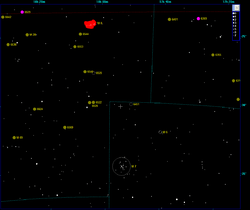OGLE-2005-BLG-390L
 OGLE-2005-BLG-390L's location in the night sky. | |
| Observation data Epoch J2000.0 Equinox J2000.0 | |
|---|---|
| Constellation | Scorpius |
| Right ascension | 17h 54m 19.2s[1] |
| Declination | −30° 22′ 38″[1] |
| Apparent magnitude (V) | 15.7 |
| Characteristics | |
| Spectral type | M4[1] |
| Astrometry | |
| Distance | 21,500 ±3300 ly (6,600 ±1,000 pc) |
| Details | |
| Mass | 0.22 M☉ |
| Other designations | |
EWS 2005-BUL-390, EWS 2005-BLG-390[1] | |
| Database references | |
| SIMBAD | data |
| Extrasolar Planets Encyclopaedia | data |
OGLE-2005-BLG-390L is a star thought to be a spectral type M (a red dwarf; 95% probability, 4% probability it is a white dwarf, <1% probability it is a neutron star or black hole). This dim magnitude 16 galactic bulge star is located in the Scorpius constellation at a far distance of about 21,500 light years.[1]
Planetary system

OGLE-2005-BLG-390L has one known planet, which was discovered using the technique of gravitational microlensing. Indications are that the planet is about five times Earth mass, orbiting at about 2.6 astronomical units from the parent star. The discovery was announced on January 25, 2006.[2] OGLE-2005-BLG-390Lb is considered one of the smallest known extrasolar planets around a main sequence star, possibly rocky, with a mass around 5.5 times that of the Earth. The orbital radius (assuming a circular orbit) of the planet is 2.6 AU, however the orbital elements are unknown. Based on its low mass and estimated temperature of around 50 K, the planet is thought to consist mainly of ices, like Pluto or Uranus, rather than being a Jupiter-like gas giant.[2]
| Companion (in order from star) |
Mass | Semimajor axis (AU) |
Orbital period (days) |
Eccentricity | Inclination | Radius |
|---|---|---|---|---|---|---|
| b | 5.5 M⊕ | 2.6 | ~3500 | — | — | — |
See also
- List of stars with extrasolar planets
- OGLE-2005-BLG-169L
- Optical Gravitational Lensing Experiment (OGLE)
References
- 1 2 3 4 5 "SIMBAD query result: NAME OGLE 2005-BLG-390 -- (Micro)Lensing Event". Centre de Données astronomiques de Strasbourg. Retrieved 2009-04-30.
- 1 2 Beaulieu, J.-P.; et al. (January 2006). "Discovery of a cool planet of 5.5 Earth masses through gravitational microlensing". Nature. 439 (7075): 437–440. arXiv:astro-ph/0601563
 . Bibcode:2006Natur.439..437B. doi:10.1038/nature04441. PMID 16437108.
. Bibcode:2006Natur.439..437B. doi:10.1038/nature04441. PMID 16437108.
External links
- OGLE: 2005-BLG-390 Event
- Small Rocky Planet Found Orbiting Normal Star
- "OGLE-05-390L". Exoplanets. Retrieved 2009-04-30.
Coordinates: ![]() 17h 54m 19s, −30° 22′ 38″
17h 54m 19s, −30° 22′ 38″